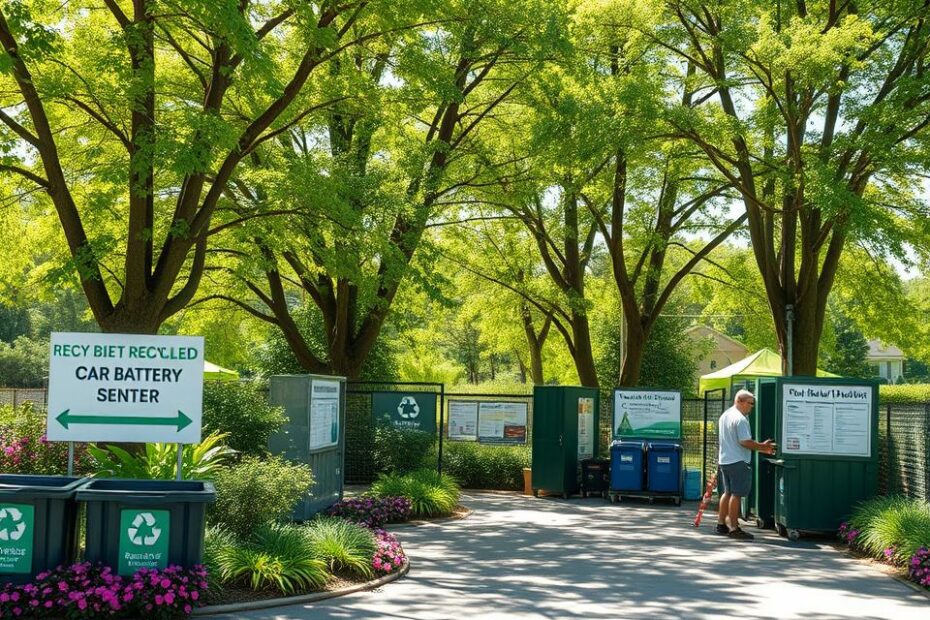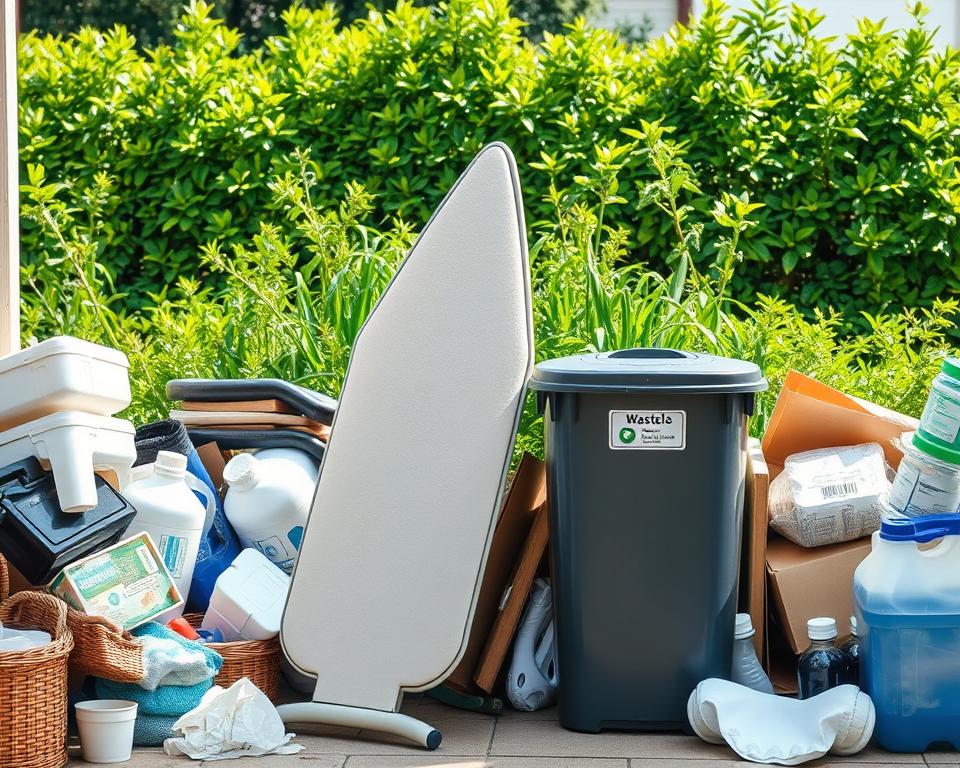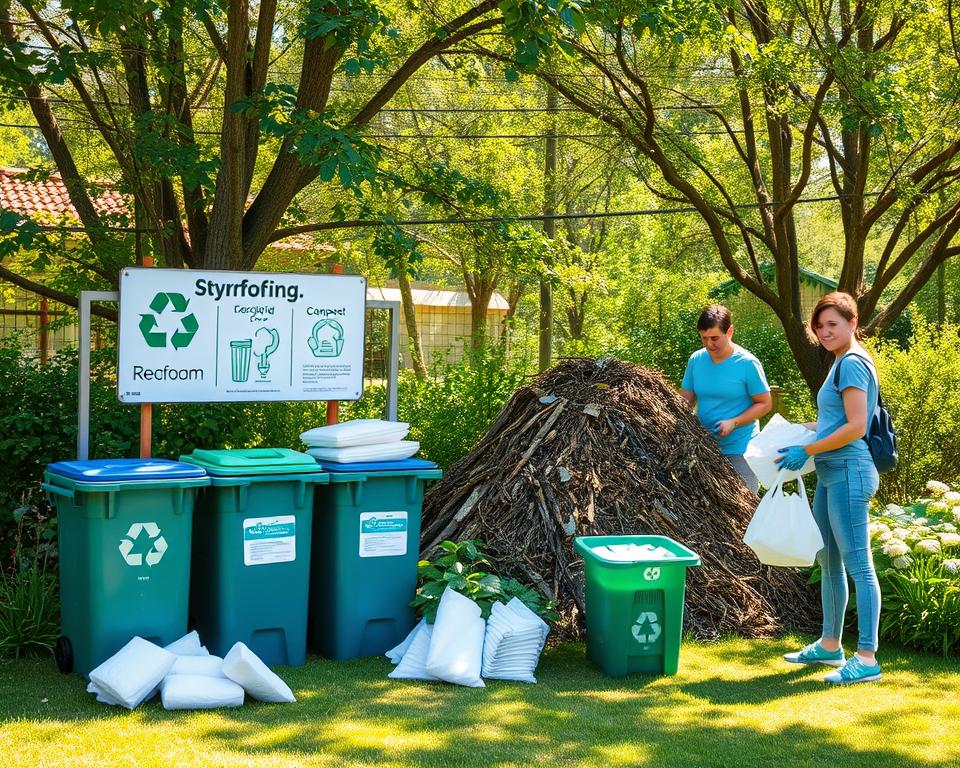Imagine starting your car and hearing that dreaded click instead of the comforting roar of the engine. You take a moment to reflect, realizing your trusty vehicle has just whispered its final farewell with a battery gasping for its last breath. It’s a scenario that many of us have faced, yet it brings to light a critical responsibility we share: the safe and proper disposal of car batteries.
After all, these powerful components don’t just power our cars; they also contain hazardous materials that can harm our environment if not handled correctly. Knowing how to dispose of a car battery is not just a task, but a way to honor the resources we depend on and protect our beautiful planet for future generations. This guide offers essential tips, local resources, and insight into the eco-friendly car battery disposal you can rely on.
Key Takeaways
- Understanding battery types helps determine proper disposal methods.
- Car batteries contain hazardous materials like lead and acid.
- Many states have specific disposal regulations for car batteries.
- Almost all car batteries can be recycled effectively, with a high recovery rate.
- Local retailers often provide convenient drop-off options for car battery disposal.
- Using rechargeable batteries can minimize environmental impact.
- Awareness of warning signs for battery replacement can prevent disposal issues.
Understanding Car Battery Composition
Car battery composition is key to their performance and impact on the environment. Most batteries are made of lead and sulfuric acid. These materials help them work well. There are mainly two types: lead-acid and lithium-ion batteries.
Lead-acid batteries, found in most cars, contain harmful metals. These metals can harm the environment if not disposed of right.
The EPA says 99% of lead-acid batteries are recycled in the U.S. This is because they can be broken down into valuable materials. These materials include battery acid, metal, and plastic. They can be turned into new products or even new batteries.
One lead bar can make up to three new batteries. Refurbished batteries, which pass tests, can be sold cheaper. A car battery usually lasts about six years. But recycling can make its parts last longer.
Electric cars use lithium-ion batteries, where 80% can be recycled. But recycling lithium-ion batteries is more expensive. Knowing about different batteries and their materials is crucial for recycling. This helps reduce pollution and saves resources.
Why Proper Car Battery Disposal is Important
Proper disposal of car batteries is crucial because they contain harmful materials like lead and sulfuric acid. If not disposed of correctly, these can leak into the environment. This can pollute soil and water, causing lasting damage to our ecosystem.
Lead exposure can harm both people and animals. It’s a serious issue that needs attention.
The growing number of cars means more batteries need to be disposed of safely. In the US, millions of batteries are thrown away each year. This highlights the need for safe disposal practices.
Many states have laws to ensure batteries are recycled or disposed of safely. This prevents harmful substances from ending up in landfills. It helps protect our planet.
Teaching people about the importance of battery disposal can make a big difference. When we dispose of batteries correctly, we help the environment. This leads to better habits and a greener future.
How to Safely Remove a Car Battery
Removing a car battery needs careful steps to keep you safe and prevent spills. Start by wearing gloves and safety goggles. These battery removal tips will help you avoid accidents:
- Turn off the vehicle and work in a well-ventilated area.
- Disconnect the negative terminal first, using a wrench to loosen the clamp.
- Next, disconnect the positive terminal in the same manner.
- Check the battery for leaks or corrosion. Handle it with care if you find any.
- Finally, lift the battery out carefully, avoiding tilts to prevent spills.
Always take the right precautions when dealing with car batteries. If unsure, getting help from a pro is wise. Proper removal keeps you safe and helps the environment.
Using the right techniques for removing batteries keeps you safe. It also helps with recycling.
Methods for Proper Car Battery Disposal
Finding good ways to dispose of car batteries is key for safety and the environment. Recycling car batteries is the best choice because of the dangers of not doing it right. Almost all lead-acid batteries in the U.S. are recycled, showing how important it is to do it right.
Many auto parts stores and retailers take old car batteries. They often give discounts on new batteries if you bring in the old one. For example, at Advance Auto Parts, getting a new battery for a 2015 Toyota Corolla might cost about $200. You also get a $25 core deposit back when you return the old battery.
Local hazardous waste facilities are crucial for safe battery disposal. Community events focused on hazardous materials make it easy to recycle batteries. These efforts help keep our environment safe and promote sustainability.
The recycling process for car batteries includes several steps:
- Material Recovery: Lead and other valuable metals, like nickel and cobalt, are separated from plastic parts.
- Safe Processing: The battery acid is neutralized or treated for safe disposal.
- Reusing Materials: Recycled metals are used in making new batteries, saving resources.
Industry rules, like extended producer responsibility, make sure batteries are recycled. Following these steps helps protect the environment and saves resources. Recycling car batteries is a big step for everyone to take.
| Disposal Method | Description |
|---|---|
| Retailer Drop-off | Many retailers accept car batteries for recycling, often giving discounts on new purchases. |
| Hazardous Waste Facilities | Local facilities specialize in the safe disposal of hazardous materials, including car batteries. |
| Community Collection Events | Events organized by local governments allow residents to drop off old batteries for eco-friendly disposal. |
| Professional Recycling Services | Dedicated services focus on recycling car batteries, ensuring compliance with environmental regulations. |
Dispose of Car Battery: Step-by-Step Guide
Getting rid of a car battery is a step-by-step process. First, safely take out the battery from your car. Make sure to follow the safety tips we talked about. Then, look for a recycling center or a place like AutoZone or O’Reilly Auto Parts that takes old batteries.
Before you move the battery, make sure it’s secure and upright. This stops any electrical dangers during transport. When you get to the disposal place, follow any special rules they have. This helps keep our environment safe.
Keeping track of how you dispose of the battery is good. It shows you’re responsible and might even meet state rules. As electric cars become more common, knowing how to recycle batteries is key. With over 140 million electric cars expected soon, it’s more important than ever.
Local Recycling Options for Car Batteries
Finding places to recycle car batteries is key to safe disposal. Many auto stores offer recycling services for old batteries. O’Reilly Auto Parts and Batteries Plus are two examples that accept car batteries for recycling.
In areas like Reno and Sparks, there are 10 spots for dropping off car and boat batteries. It’s important to call first for prices and hours. About 40% of these places pay for scrap metal, making it a good deal.
- 30% of locations encourage bringing in old car batteries when purchasing a new one.
- 20% of listed locations are open on Saturdays for drop-offs.
- Facilities do not operate on Federal holidays.
There are also other ways to recycle, like Return to the Store and the Firestone Battery Recycling Program. AutoZone offers recycling options too. These choices make it easy for people to recycle their batteries responsibly.
Eco-Friendly Car Battery Disposal Practices
Environmentally friendly car battery disposal focuses on recycling and reducing harm to the environment. Lead batteries are recycled at a 99% rate in North America. Yet, nearly 1 million batteries are not recycled each year. This highlights the need for better battery disposal practices.
Joining community battery collection drives helps raise awareness about battery waste dangers. Organizations like AAA have recycled 30 million batteries. This shows the success of recycling efforts.
Working together among automakers, battery makers, recyclers, and policymakers is key. Supporting good government rules helps ensure batteries are disposed of correctly. This encourages everyone to recycle responsibly.
Recycling car batteries also helps the economy by creating jobs and growing it. It cuts down on harmful emissions and saves energy. By teaching more about recycling, we can change behaviors for the better.
Battery Disposal Requirements by State
Battery disposal laws vary across the United States. Each state has its own rules for disposing of batteries. Knowing these rules helps avoid fines and supports the environment.
In California, all batteries are considered hazardous waste. This means they can’t be thrown away with regular trash. The state’s AB 2440 law requires special programs for battery management. Other states have similar rules, requiring batteries to be taken to recycling centers.
Here are some key battery disposal rules by state:
| State | Effective Date | Deposit Required | Deposit Refund Period | Fee |
|---|---|---|---|---|
| Arizona | 9/27/90 | Varies | 45 days | 100% retailer split |
| California | 1/1/89 | N/A | 45 days | $1; $2 starting 4/1/22 |
| Idaho | 7/1/91 | $10 | 30 days | N/A |
| Maine | 10/30/89 | $10 | N/A | $1.00 |
| Missouri | 1/1/91 | N/A | N/A | $0.50 |
| Minnesota | 10/4/89 | $10 | 30 days | N/A |
| New York | 1/1/91 | $5 | N/A | 100% retailer split |
Florida and Washington D.C. have their own rules. Florida doesn’t let nickel-cadmium and small sealed lead batteries go to regular trash. Washington D.C. has a Zero Waste Omnibus Amendment Act that requires following battery disposal bans.
Knowing about battery disposal laws helps us act responsibly. It keeps our environment safe and supports recycling. To follow these rules, check with your local environmental agency for more details.
Signs Indicating a Battery Needs Replacement
Knowing battery replacement signs is key to avoiding car trouble. Car batteries usually last three to five years. But, as they age, they may start to show signs of needing a replacement.
Look out for dim headlights and slow engine starts. Dashboard lights can also warn you of a weak battery.
Extreme weather can shorten a battery’s life. Be careful in both cold and hot weather. Short trips can also drain the battery faster.
Leaving lights or electronics on without the engine running can harm the battery. Driving your car for at least 20 minutes helps keep the battery charged, especially in winter.
Using a multimeter is a good DIY way to check the battery. A reading under 12.6 volts means it’s bad. Also, check the terminals for corrosion, as it can block power flow.
Batteries over four to six years old or showing signs of damage should be replaced. Swelling or leakage are clear signs it’s time for a new one.
| Battery Replacement Signs | Description |
|---|---|
| Diminished Headlight Brightness | Dim or flickering lights may indicate a weak battery. |
| Slow Engine Cranking | Difficulty starting your vehicle is a key warning sign. |
| Warning Lights on Dashboard | Check engine light or battery warning light may appear. |
| Physical Damage | Swelling or leaking signals a need for immediate replacement. |
| Age of Battery | Replacement recommended every 4-6 years. |
Spotting these signs early can help replace your battery on time. This avoids environmental harm and keeps your car running smoothly.
Conclusion
Safe battery disposal is a team effort for a greener planet. Knowing how to dispose of batteries helps us all. It keeps our environment safe and follows the law.
Recycling car batteries is key to protecting our health and planet. It stops harmful materials like lead from harming us. Recycling also saves resources by reducing the need for mining.
Using EPA-certified recycling centers is important. It ensures batteries are handled right. By following this guide, we all help keep our planet clean. Together, we make a difference for our health and the future.
FAQ
How should I dispose of my old car battery?
Recycling your old car battery is the best option. Many auto parts stores and recycling centers accept them. Check with places like AutoZone or The Home Depot for recycling options. This helps handle the battery safely and protects the environment.
What are the legal requirements for disposing of car batteries?
Laws about disposing of car batteries vary by state. Most states consider them hazardous waste. It’s crucial to know your state’s laws to avoid fines.
Can I throw away a car battery in the trash?
No, throwing a car battery in the trash is illegal in many places. Car batteries contain harmful materials like lead and sulfuric acid. This can pollute the environment.
What are the dangers of improper car battery disposal?
Improper disposal can leak toxic materials into the environment. This can contaminate soil and water. It poses risks to people and wildlife.
Where can I recycle car batteries?
You can recycle car batteries at auto parts stores like AutoZone or O’Reilly Auto Parts. Also, check with your local hazardous waste facilities. Many communities have special events for recycling batteries.
How can I safely remove a car battery?
Wear gloves and goggles when removing a car battery. Disconnect the negative terminal first, then the positive. Check for leaks or corrosion before taking it away.
Are there eco-friendly car battery disposal practices?
Yes, using recognized recycling programs is eco-friendly. Participating in community collection drives also helps. These practices reduce environmental harm and promote responsible disposal.
How can I tell if my car battery needs replacing?
Look for signs like dim headlights, slow engine start, a swollen battery, or leaks. If your battery is over four to six years old, test it and consider replacing it.
What should I do with a leaking car battery?
Handle a leaking car battery with care. Wear protective gear to avoid acid contact. Take it to a recycling center or hazardous waste facility for safe disposal.
What materials are car batteries made of?
Car batteries, especially lead-acid ones, are made of lead and sulfuric acid. These materials are crucial but can harm the environment if not disposed of correctly.
Source Links
- https://www.homedepot.com/c/ab/how-to-dispose-of-batteries/9ba683603be9fa5395fab90124a115f1
- https://www.autotrainingcentre.com/blog/car-battery-disposal-guide-auto-careers/
- https://www.familyhandyman.com/article/how-to-dispose-of-car-batteries/
- https://www.continentalbattery.com/blog/how-it-works-the-step-by-step-of-lead-acid-battery-recycling



